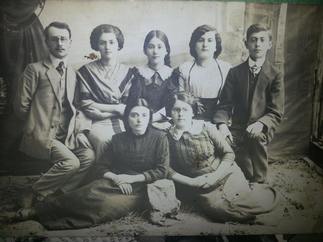 Ten years ago I travelled with my Dad to America for a family visit. It was the first time I had met most of his first cousins – and it turned out to be the last time I saw his sister, my dear aunt Lil, who died a few years later. One of Dad’s relatives, irrepressible and wonderful cousin Betty, is a psychic and clairvoyant. Betty is much on my mind at the moment as wildfires rage around Los Angeles, forcing her to evacuate her home. “I know you are a writer, but have you ever thought about doing documentaries?” she asked me back in 2008. “I’d love to make documentaries!” I replied. “Well, you will.” And today, ten years on, the first documentary I have been involved in is being broadcast on the BBC's World Service radio station. It’s a ten-minute piece about the lost Jewish world of the Eastern European shtetl, using anecdotes recounted by my grandmother about her early life back in Ukraine – then part of the Russian Empire. Mostly when I give talks about my work, I focus primarily on the dramatic major events that affected Russia’s Jewish community at the time – pogroms, World War I, the Russian Revolution and civil war. But the documentary concentrates on more mundane aspects of day-to-day life, such as Sabbath rituals in my grandmother’s house, relations with the local Ukrainian population, the Rabbi’s court where members of my family lived and worked, and a crazy and somewhat comical incident that landed my great-great grandmother in jail, to the horror and embarrassment of the whole family. The documentary is based on snippets of recordings made by my father back in the 1970s of my grandmother telling stories about her early life in Russia. They are recorded in Yiddish, the language of the Jews of Eastern Europe. It is a language once spoken by around 12 million people that transcended national boundaries, but which was almost wiped out by the holocaust. The vast majority of the Jews killed in the Nazi death camps would have spoken Yiddish as their mother tongue. Today the language is undergoing something of a revival, in the US in particular. Surprisingly there are still up to two million Yiddish speakers in the world. You can sign up to Yiddish evening classes, watch Yiddish theatre performances and attend Yiddish dance parties. In 2017, the Yiddish Arts and Academics Association of North America was born, with a mission to promote Yiddish language and culture through academic and artistic events and through Yiddish food. “The goal,” says founder Jana Mazurkiewicz Meisarosh, “is to make Yiddish culture hip, modern and interesting.” In the US, “Yiddish has been trapped within two discrete, hermetic spheres: the ultra-Orthodox sphere, which engages the religious aspects of Yiddishkeit, and the academic sphere, which tends to study secular Yiddishkeit of the past. As a result, Yiddish language and culture … is often viewed as a relic of the past, and fails to find resonance in daily life and modern culture,” she says. It’s a fascinating and worthy goal, to bring back to life a language that came close to extinction. The culture of the shtetl is unlikely to be reborn outside of the most restrictive Jewish communities, but if it can gain further resonance in today’s world, this is surely something to celebrate. Listen to the documentary here: www.bbc.co.uk/programmes/w3cswsp3
0 Comments
Leave a Reply. |
Keeping stories aliveThis blog aims to discuss historical events relating to the Jewish communities of Ukraine, and of Eastern Europe more widely. As a storyteller, I hope to keep alive stories of the past and remember those who told or experienced them. Like so many others, I am deeply troubled by the war in Ukraine and for the foreseeable future, most articles published here will focus on the war, with an emphasis on parallels with other tumultuous periods in Ukraine's tragic history. Archives
March 2024
Categories
All
|
 RSS Feed
RSS Feed
